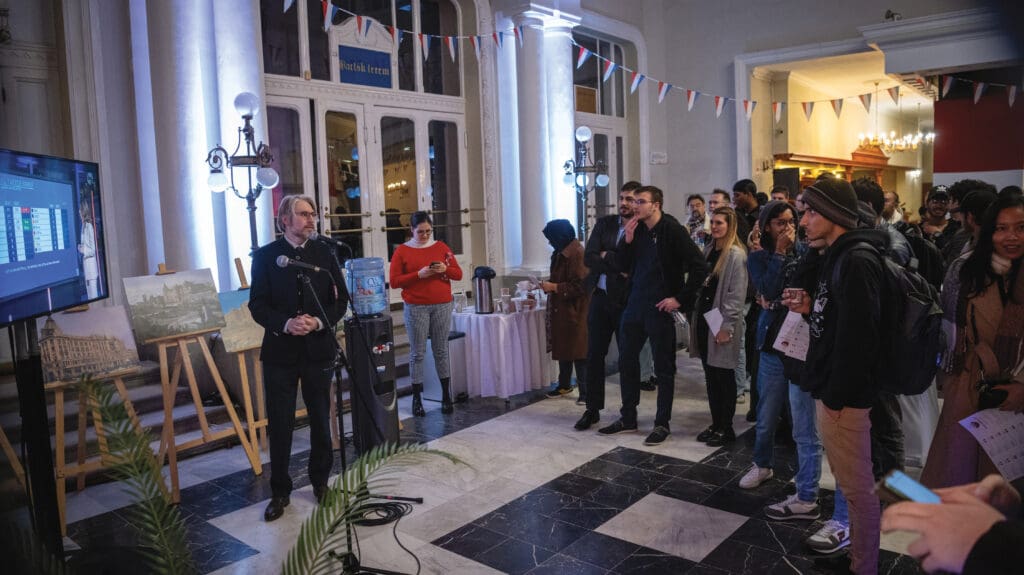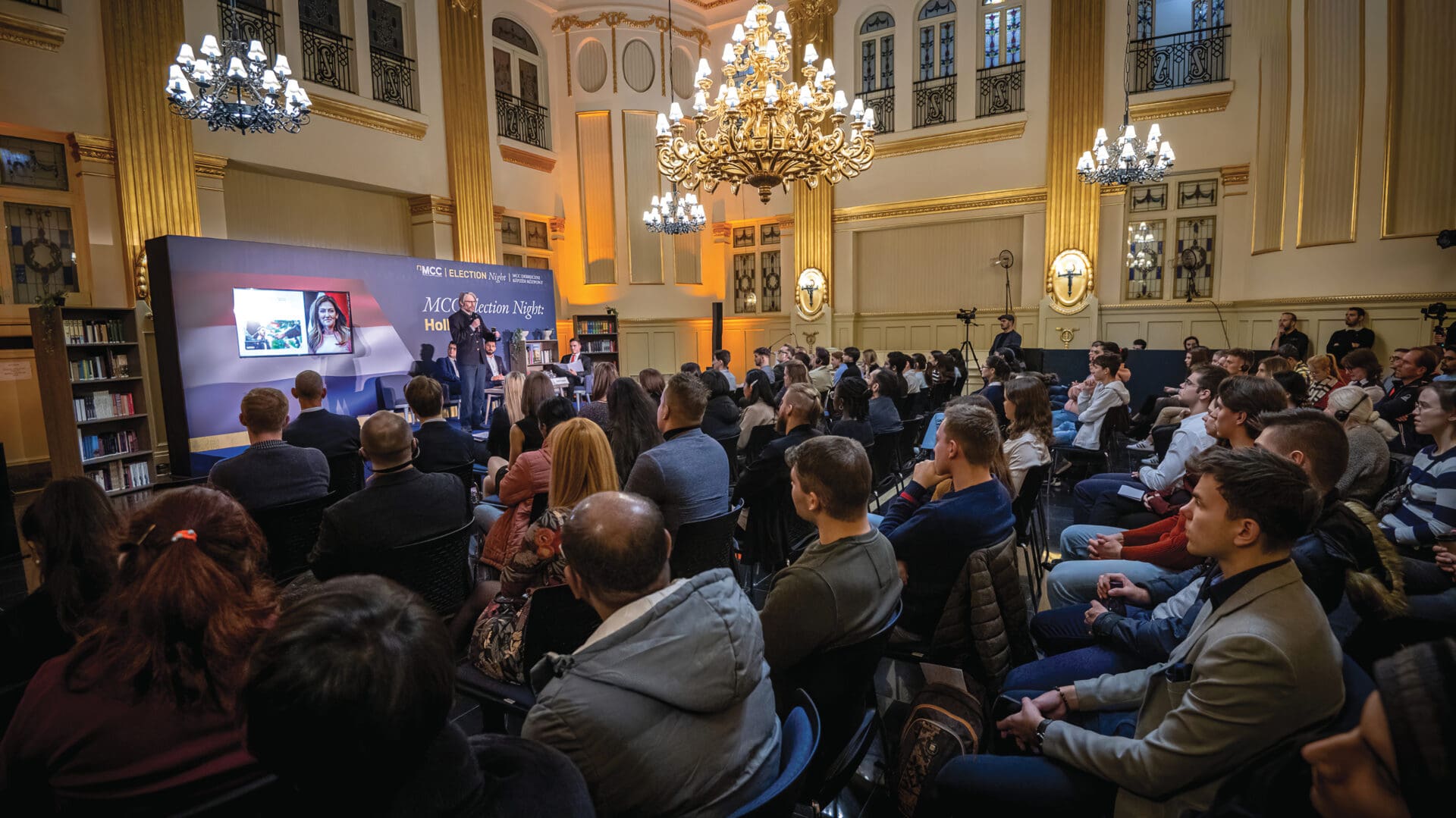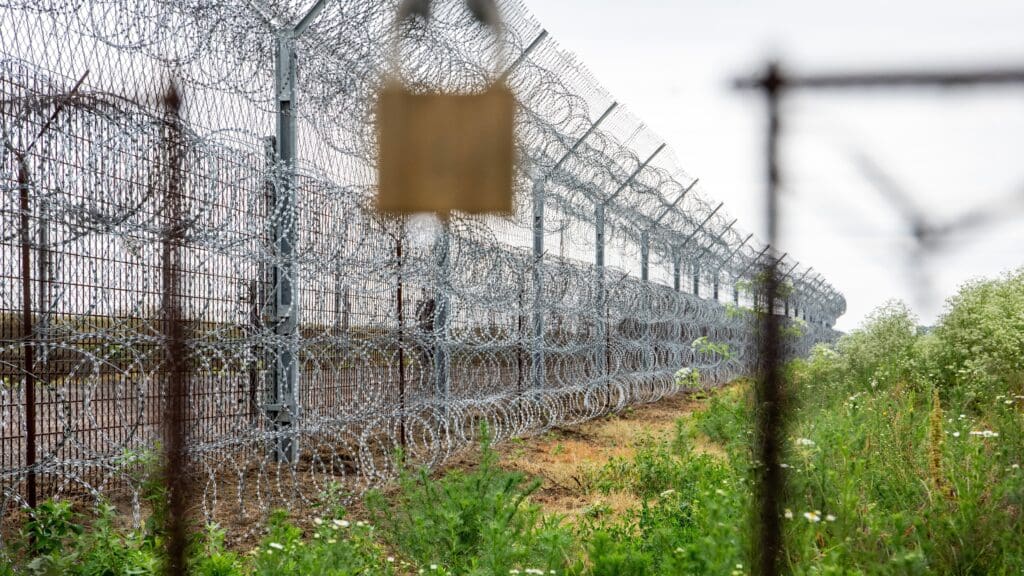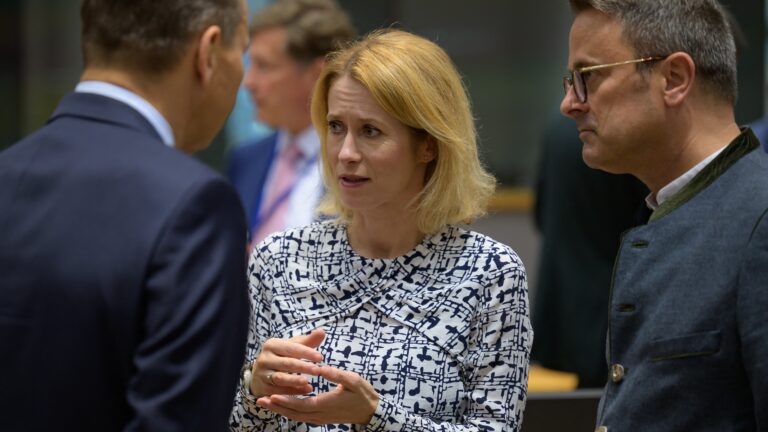This article was published in Vol. 4 No. 1 of our print edition.
Despite the surprise victory of anti-Islam politician Geert Wilders in the Dutch national elections of 22 November 2023, and his further increased dominance in the polls since then,1 there is as yet no right-wing coalition government, let alone one that will lay out solid conservative policies. Of course, we do not know where all this will end, but a hard lesson seems to be looming for conservative Europe: electoral victories by nationalistic populists yield little substance in terms of conservative policy and institutional change if these wins are divorced from a broader conservative movement with serious conservative ideas, prestigious knowledge institutions, and a solid talent pool from which to draw policymakers, representatives, bureaucrats, and professionals.
War in Dutch Politics
All is quiet on the Dutch front; that is, the war rages on, but the lines do not seem to be moving. Dutch politics is stuck in gridlock, with no concrete prospect of a Wilders-led coalition government forming soon. The coalition talks are dragging on. These talks currently involve Wilders’s PVV (23.5 per cent of the vote), the initially classically liberal VVD, led until recently by outgoing Prime Minister Mark Rutte (15.2 per cent), the new Christian Democratic party NSC (12.9 per cent) and the Farmer–Citizen Movement, the rebellious farmers’ party BBB (4.7 per cent). Precisely what is being negotiated is confidential and unknown to the outside world, but the atmosphere between the negotiating parties appears frosty, and lacking in concessions from the centre-right, as can be gauged from Wilders’s growls on X.com, where he tweeted, for example, that the new leader of the VVD, Yeşilgöz, is ‘sour’ and ‘sneering’.2
But then, these talks are unprecedented in their stated ambition: forming a truly right-wing government with political veteran Geert Wilders in the driver’s seat. Wilders, known for his criticism of Islam, EU federalization, and mass migration, has been in Parliament since the 1990s, where he started as a liberal parliamentarian. But his party, the PVV, founded in 2005 to fight Islamization and Islamism, has never before been the largest in national elections or led coalition talks, and has never formed part of a national government coalition. The PVV is now leading coalition talks for the first time, seeking to put itself at the helm of a government more right-wing than any other in living memory.
Rechtsruck?
The Dutch elections and their outcome have, therefore, rightly attracted much international attention, although over-interpretation and overblown expectations lurk. Both concerned critics and enthusiastic supporters see a possible foreshadowing of a right-wing turn throughout Europe. Eagerly awaited in conservative circles, that turn, for the left, is the dreaded Rechtsruck, against which massive demonstrations are already taking place on the streets in Germany, even though AfD polling leads have not yet translated into any significant electoral victories. There were no major demonstrations against Wilders in the Netherlands, but the broader political dynamic—populist ascendance coupled with elite and leftist consternation—resembles the German situation. And one can draw parallels with Trumpism, too.
‘There is as yet no right-wing coalition government, let alone one that will lay out solid conservative policies’
At any rate, the British newspaper Financial Times is sure: ‘Geert Wilders’ win in Dutch election is a boon for Europe’s far-right.’3 The ‘far right’ label is, of course, a polemic, interested value judgment (although Wilders does advocate overtly discriminatory policies towards Dutch Muslim communities). Still, the question remains: What does his election victory presage? Do Dutch developments offer a glimpse of the near future for Western Europe, and the EU parliamentary elections in particular? If the supposedly progressive Netherlands chooses Wilders, then can the right surely flourish anywhere in the West?
Most readers of Hungarian Conservative will find the latter a hopeful thought. As a conservative Hungarian, one could further cherish the specific hope that Wilders’s win will lead to a mending of diplomatic relations between Hungary and the Netherlands. Under Prime Minister Mark Rutte and the current Dutch governing elite, the Dutch state is one of Hungary’s sharpest opponents within the EU. In contrast, Wilders has maintained excellent relations with Prime Minister Orbán and the centre-right party Fidesz for years. Thus, a very tense relationship could quickly be relaxed, at least if Wilders manages to make his mark on a future coalition government—but that is a big ‘if’, as I will argue below.
Dutch Election Night in Debrecen
Although interest in Dutch politics spiked after Wilders’s win, there had already been much international attention in the run-up to the November elections. On election night, I spoke as part of a panel in a splendid hall in Debrecen, Hungary, in front of 130 mainly young spectators. The organizer was the Debrecen branch of the Mathias Corvinus Collegium (MCC), a Hungarian extracurricular educational institute. Led by István Bognár, MCC-Debrecen had chosen the Netherlands for its first election event.
But why? And why was the hall filled and so enthusiastic? The Netherlands is not that big a deal, is it? What is more, at the beginning of the evening, neither the organizer nor the attendees could have known that the results would be so spectacular. In the last polls, the PVV had been roughly tied with the liberal VVD, the left-wing GL/PvdA, and the Christian Democrat NSC, in which case the latter three parties could have ignored the PVV. They could have ruled together in some combination, even if the PVV would have got slightly more votes than any of them. In fact, the trend seemed so solidly centre-right that the liberal Financial Times was still terribly enthusiastic just days before the election, in sharp contrast to its post-election mood: ‘The Dutch are piloting a saner European right’, ran one fateful column headline six days prior. The first sentence of the piece: ‘Post-Thatcherite, post-Trumpian, next week’s elections are tapping into a mood for dry moderation’.4 In the Dutch context, dry moderation would have meant a coalition with Christian Democrats in partnership with either the Social Democrats or the Liberals. Yawn. What could be more boring?
Moreover, the programme, which started with two analytical panels and ended with the announcement of the election results, which came in live via TV, took no less than three hours! I looked into the audience occasionally to check whether people were on their phones—no! I could not believe it: the audience, mainly students from MCC and the University of Debrecen, listened intently for hours. To what? To analyses and forecasts of the Dutch elections. Crazy.
Granted, the panellists did a superb job exploring the subject. The three Hungarian panellists—Zoltán Lukács, Omar Sayfo, and Fanni Lajkó—were remarkably knowledgeable about Dutch politics. The other two panellists were friends I had recruited at the organizer’s prompting: Bart Jan Geers and Rod Dreher. Bart Jan was the only Dutchie apart from me. He is a security expert, retired infantry colonel, and hussar and horse-riding enthusiast who regularly comes to Hungary to perform in horse shows in full hussar dress (read his interview in the Hungarian magazine Demokrata).5 On 22 November, he was in Debrecen for a Hungarian language course.
Rod Dreher, an American writer and my colleague at the Danube Institute, needed days of intense peer pressure. He initially did not want to partake because he did not consider himself competent to speak on Dutch politics. En route to Debrecen from Budapest in a minivan, he kept making self-deprecatory remarks about how he supposedly knew nothing about anything. In Debrecen, I teasingly introduced him to people as ‘a Netherlands expert’. But in truth, Rod is a Dutchophile who often visits the Netherlands and has been following Dutch politics for decades. He did well on stage in Debrecen and wrote a well-informed analytical essay.6
I had the honour of announcing the first incoming exit poll. The surprise results led to a confused silence, partly because many of the attending Debrecen students hailed from South and Southeast Asia; some could be presumed to be Muslim and were unlikely to think well of Wilders. The eyes of a Pakistani MA student, whom I spoke to later, widened when he heard me announce that Wilders had triumphed. What probably increased the shock effect was my consistent use throughout the evening of the label ‘anti-Islam’ for Wilders and the PVV, which I stand by because it is the most accurate descriptor. Some Hungarian students will no doubt have wanted to cheer or clap, either because Wilders is known to be a friend of Orbán and Hungary or simply because the results were so spectacular—but they kept quiet, possibly out of politeness towards the Muslim students present.
Or it could have been my worried body language and intonation. As a citizen of the Netherlands, I am not happy with an outcome that I knew would paralyse the political process for months. Moreover, I supported my friend Diederik Boomsma, who was running for the Christian Democratic NSC and just missed making it into Parliament.
Reputation
However, despite all the drama on that election night and the lousy sleep many Dutch bureaucrats and journalists must have had, it is by no means settled that Wilders will become prime minister. The largest party often delivers the prime minister, but that is not always so and is not a constitutional requirement.
Like many, I still cannot believe that Wilders could become prime minister, given his years of demagogic outbursts and his abysmal reputation among the parts of the nation that ‘matter’. He shocked polite society with condescending statements about Dutch Muslims and unworkable, discriminatory policy proposals. For years, for instance, he wanted to ban the sale of the Quran—which he recently took back in the hope that this would increase his chances in coalition talks. And since 2012 Wilders has held that the Netherlands should leave the EU, which is legally and electorally unfeasible and unpopular even among much of his voting base. The Netherlands prides itself on being a core EU country.
Do not misunderstand me: Wilders is not a bad man. He is a patriot who cares about his country and his nation, and is on the right side of many of the most fundamental normative issues, such as in the international fight against Islamism, Islamic terror, and anti-Semitism. But it remains hard to imagine him leading the Netherlands.
Islam
Hungarian readers should know that Wilders’s stance vis-à-vis Islam is very different and much less reasonable than that of the Hungarian government, because Wilders rallies against a large-scale Muslim presence in a country that already has such a presence. Yes, Wilders’s rhetoric superficially resembles that of Hungarian Prime Minister Orbán, who made it clear in many public statements, including his 2018 State of the Nation address, that he is against mass migration from the Islamic world: ‘We have prevented the Muslim world from inundating us from the south.’7

However, context is decisive for the meaning of such statements. Prime Minister Orbán makes his statements in Hungary, a country without a large, established Muslim population. His message to Muslims is that an individual Muslim will be welcomed as a guest, but that Muslims as a collective will never become part of the Hungarian nation. The Hungarian nation is formed by a diverse composition of Central European ethnicities, including the Magyars, but also, for example, Ungarndeutschen and Jews with ties to the region; Muslims are not and will not become a component of that multi-ethnic, multi-religious composition. The Hungarian government is open about that, fairly and transparently; Muslims know what to expect.
How different is the context of Wilders’s statements: a million Muslims are living in the Netherlands. That group consists mainly of 1) Muslim migrants who were promised that they could become full Dutch citizens and that their religion has an equal place within the Dutch system, and 2) their children and great-grandchildren, whose mother tongue is often Dutch and not Turkish or Arabic. If you turn around and tell those people that they do not belong or are unwanted, you will only create bad blood. The Netherlands has made promises. Sixty years ago, the Dutch could have chosen not to bring in Islam on a massive scale, but that stage is long gone. Fantasizing about mass emigration, as Wilders has often done and which even landed him a criminal record, is a dead end and politically illegitimate.
Knowing that his empty provocations have damaged him, Wilders now promises to become ‘ever milder’ (steeds milder). He is undergoing a strategic penance; the coalition talks, in which he is being grilled by the centre-right for all the unsavoury proposals he has made over the years, are something of a moral cleansing ritual. For instance, he withdrew his proposals to ban the sale and distribution of the Quran and close all Dutch mosques. People began jokingly calling him ‘Milders’; in Dutch, ‘wild’ and ‘mild’ mean roughly the same thing as in English.
It is doubtful whether his very suddenly acquired ‘mildness’ and political penance will be enough to convince the Christian Democrat NSC, in particular, to form a government with Wilders. Wilders may step aside and endorse another less controversial person for the premiership.
Strategic Stalling
However, it is not even certain that there will be a coalition with the PVV at all, despite other coalition options being numerically challenging. Shortly after the 20 November election results, I wrote this somewhat cynical analysis on the website of US magazine Telos:
‘The established and centrist parties have excluded Wilders’s PVV from executive power for seventeen years and may continue to do so despite his electoral success. However, this time, these parties will probably not be able to form a coalition without the PVV. Instead, they are incentivized to go through the motions for months on end, pretending to want to create a new government while blaming each other for its non-formation, after which new elections eventually will have to be called.’8
For now, the data points fit the above prediction I made in late November, but things could take a different turn. The centre-right parties could still dump Wilders and go in with Frans Timmermans of the left-wing GL/PvdA bloc, although many voters would see that as a betrayal. But if the centre-right parties are indeed just going through the motions—faux-negotiating with Wilders only to make it seem as if they respected the vote, after which new elections will have to be called—they had better walk down that path in slow motion. Wilders is currently even higher in the polls than his already sky-high election win last year: his party now polls at 30 per cent.9 That is if new elections were called now, Wilders would have the chance to take even more seats in Parliament.
The State Bureaucracy Strikes Back
But even if there is a right-wing government with the PVV, with or without Wilders as prime minister—yes, even then—there is unlikely to be a political paradigm shift. The governing class—including the higher echelons of the civil service, which is a silent leader throughout Europe but particularly in the Netherlands—will neutralize Wilders’s victory. The only question is how and at what stage.
The governing class, especially within the civil service, is not pushed aside by just one inconvenient election outcome. The civil service forms a block of ideological inertia, blunting innovating initiatives coming out of politics when these conflict with its dominant ideological presumptions. On occasion, its carriers even act with aggressive activist intent. For example, Prime Minister Mark Rutte’s current policy towards Israel is being actively sabotaged by anonymous civil servants who send ‘criticisms’ and ‘leaks’ to allied journalists.10 They thereby seek to pressure Rutte into renouncing Israel, which would, in turn, pressure Israel to abandon its fight against Hamas in Gaza. More broadly, for years, there have been indications that Dutch ministers are played and undermined by networks of top officials, in the style of the British television series Yes, Minister.11
Not Ready to Lead
On the other hand, Wilders’s PVV is in any case not ready to lead the Netherlands, as it lacks institutional, educational, and intellectual groundwork. This, in turn, is due to the PVV being not conservative but populist, and thus struggling with a generic, ultimately self-limiting distrust of knowledge institutions, bureaucracy, and elite formation. Generic distrust is self-excluding. It further expands the already large social distance to societal elites. Self-exclusion, alongside the exclusion mechanisms maintained by society’s establishments and elites, hamper the PVV’s ability to recruit competent, talented candidates for public office.
All this is a general challenge faced by populist political parties, but in the case of the PVV, the spirit of self-exclusion even takes the form of outright defeatism built into the organizational structure. Instead of trying to gradually shake off the social stigma and still recruit as many good people as possible—as did the Sweden Democrats—the PVV, structurally and from the beginning, plays to lose. A case in point: the party has no members. That is, Wilders is legally the only member of the PVV—because it fears it would attract too many bad people. But precisely because the PVV proceeds from that pessimism, it becomes difficult to recruit good people. Also, because the PVV has no members, it is the only party in the Netherlands that does not receive a subsidy for independent policy research, which parties receive based on membership numbers. This, in turn, reinforces the PVV’s unintellectual character, which again repels people of quality.
Thus, the PVV is an empty shell: a mere campaign vehicle without genuine ideas, policy research, future leaders, policy successes, or civil society connections. Even on its best day, it will not leave a dent in the block of brute ideological inertia that is the state bureaucracy, with its hundreds of thousands of officials and landscape of aligned knowledge institutes.
Here, the core problem of populism is on full display. Right-wing populists win elections in Western Europe playing on distrust of bureaucratic and knowledge institutions—‘the elite’, in their undifferentiating imagination—but that is ultimately not a winning strategy in a broader political sense, for a political movement must build and lead institutions and have its own administrative, cultural, and scholarly elites to draw on. What is needed is a genuinely conservative movement with cross-fertilizing political-administrative and scholarly-educational flanks, which, of course, is precisely what has been under construction in Hungary. Hence, Europe’s conservative right should learn from the Netherlands only negatively: it must not fall into the populist trap of anti-institutionalism and anti-intellectualism. Instead, it must nourish its own institutions and ideas.
NOTES
1 Ipsos, ‘Politieke Barometer Week 5’, 31 January 2024, www.ipsos.com/nl-nl/politieke-barometer-week-5-2.
2 Geert Wilders in a tweet, 29 January 2024, 7:40 am, https://x.com/geertwilderspvv/status/1751859899355845025?s=20.
3 Andy Bounds, ‘Geert Wilders’ Win in Dutch Election is a Boon for Europe’s Far Right’, Financial Times (23 November 2023), https://www.ft.com/content/e7b7b93f-166f-4043-a1c4-a6943693f33e.
4 Andy Bounds, ‘Geert Wilders’ Win in Dutch Election is a Boon for Europe’s Far Right’.
5 Tamás Pataki and Tibor Vermes, ‘Magyar szívű holland huszár’ (Dutch Hussar with a Hungarian Heart), interview with Bart Jan Geers in Demokrata (10 January 2024), 18–21.
6 Rod Dreher, ‘Wilders’, The European Conservative (23 November 2023), https://europeanconservative.com/articles/commentary/wilders/.
7 Viktor Orbán, ‘2018 State of the Nation Address’, 18 February 2018, https://abouthungary.hu/speeches-and-remarks/viktor-orbans-state-of-the-nation-address.
8 Eric Hendriks, ‘How Israel Won the Dutch Elections’, Telos (27 November 2023), www.telospress.com/how-israel-won-the-dutch-elections/.
9 Ipsos, ‘Politieke Barometer Week 5’, 31 January 2024.
10 The following is one of the articles platforming the civil servants’ attacks on the Dutch government: Steven Derix, ‘Onwelgevallige informatie over Israël onder het tapijt geveegd’, NRC (21 January 2024), www.nrc.nl/nieuws/2024/01/21/onwelgevallige-informatie-over-israel-onder-het-tapijt-geveegd-a4187658.
11 Floor Boon and Mark Lievisse Adriaanse, ‘Ambtenaren Harbers hielden toelichting asielcijfers bewust buiten rapport’, NRC (6 November 2019), www.nrc.nl/nieuws/2019/11/06/ambtenaren-hielden-toelichting-asielcijfers-bewust-buiten-rapport-a3979422.
Related articles:








